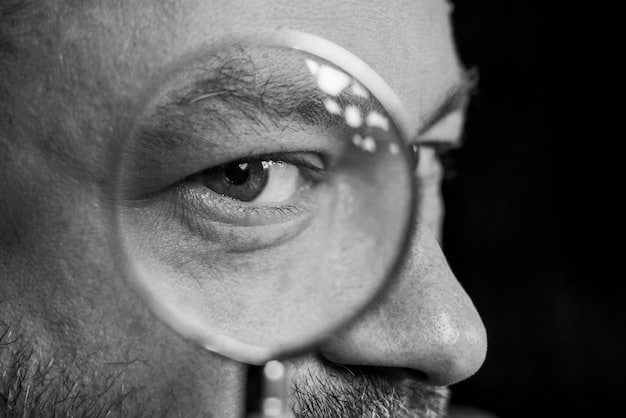The Future of Movie Reviews: Will AI Change How We Judge Films?

The Future of Movie Reviews: Will AI Change How We Judge Films? explores how artificial intelligence is transforming the way we perceive and critique movies, potentially impacting the role of human critics and the overall film industry.
The world of movie criticism is on the cusp of a significant transformation. The question looms large: The Future of Movie Reviews: Will AI Change How We Judge Films? As artificial intelligence becomes more sophisticated, its potential to analyze and evaluate films is rapidly expanding. This raises fascinating questions about the role of human critics and the very nature of cinematic judgment.
The Rise of AI in Film Analysis
Artificial intelligence is no longer a futuristic fantasy; it’s a present-day reality infiltrating various aspects of our lives, including the entertainment industry. In the realm of film, AI is beginning to play a pivotal role in analyzing and understanding movies on a deeper level.
AI algorithms can dissect films in ways that were previously unimaginable, offering insights into plot structures, character development, and even audience sentiment. This capability is reshaping how we approach film criticism and analysis.
AI’s Analytical Capabilities
AI’s strength lies in its ability to process vast amounts of data with incredible speed and accuracy. When applied to film, this translates to a detailed analysis of various elements, including:
- Scene Breakdown: Automatically identifying and categorizing scenes based on their content, mood, and relevance to the overall narrative.
- Sentiment Analysis: Gauging audience reactions to specific scenes or characters by analyzing social media comments, reviews, and other online feedback.
- Pattern Recognition: Identifying recurring themes, motifs, and stylistic choices used by filmmakers.
These analytical capabilities provide a foundation for AI-generated movie reviews that are both comprehensive and data-driven.

As AI continues to evolve, its role in film analysis will only expand, offering new perspectives and insights that complement human criticism.
The Potential Benefits of AI Movie Reviews
While the idea of AI writing movie reviews might seem unsettling to some, there are several potential benefits to consider. AI can offer a unique perspective, unbiased by personal preferences or emotional attachments.
Furthermore, AI can analyze films with an efficiency and thoroughness that would be impossible for a human critic to match, potentially uncovering hidden meanings and patterns.
Objectivity and Impartiality
One of the key advantages of AI movie reviews is their objectivity. AI algorithms are designed to analyze films based on predefined criteria, eliminating the potential for personal biases or emotional reactions to influence the review.
- Consistent Evaluation: AI can apply the same set of standards to every film, ensuring a consistent and impartial evaluation.
- Reduced Subjectivity: AI eliminates the potential for personal preferences or prejudices to affect the review.
- Data-Driven Insights: AI provides reviews based on concrete data and analysis, rather than subjective opinions.
This objectivity can be particularly valuable in an era where social media and online forums are often filled with polarized opinions and emotional outbursts.
AI’s impartial approach can provide a refreshing perspective, helping viewers make informed decisions about which films to watch.
The Limitations of AI in Understanding Art
Despite its analytical prowess, AI still faces significant limitations when it comes to understanding and appreciating art. The human experience of watching a movie is deeply personal and emotional, something that AI cannot replicate.
While AI can analyze plot structures and character development, it struggles to grasp the nuances of human emotion, the subtleties of artistic expression, and the cultural context that shapes our understanding of film.

The Absence of Emotional Connection
Art is not just about data and analysis; it’s about feeling, experiencing, and connecting with something on a deeper level. AI’s inability to replicate this emotional connection is a major limitation in its capacity to provide meaningful movie reviews.
- Lack of Empathy: AI cannot empathize with characters or understand the emotional impact of certain scenes.
- Limited Interpretation: AI struggles to interpret symbolism, metaphor, and other forms of artistic expression.
- Inability to Appreciate Nuance: AI often misses the subtle details and nuances that make a film truly special.
Ultimately, the emotional connection that humans forge with art remains a critical component of film criticism, one that AI cannot replicate.
The lack of emotional depth in AI reviews may leave viewers feeling disconnected and unfulfilled.
The Role of Human Critics in the Age of AI
As AI becomes more prevalent in film analysis, the role of human critics will inevitably evolve. Rather than being replaced by machines, human critics will likely shift their focus towards providing context, interpretation, and emotional resonance that AI cannot offer.
Human critics will continue to be valued for their ability to connect with audiences on a personal level, to share their unique perspectives, and to guide viewers towards films that resonate with their values and experiences.
Providing Context and Interpretation
One of the key strengths of human critics is their ability to provide context and interpretation that goes beyond mere data analysis. Human critics can draw on their knowledge of film history, cultural trends, and artistic movements to provide a deeper understanding of a film’s significance.
By offering context and interpretation, human critics can help viewers appreciate films on a more profound level, enriching their overall cinematic experience.
This ability to provide context and interpretation will become increasingly valuable as AI continues to provide data-driven analysis.
Ethical Considerations and Potential Biases in AI Reviews
While AI strives for objectivity, it’s important to acknowledge the potential for biases to creep into AI-generated movie reviews. AI algorithms are trained on data sets created by humans, and if those data sets reflect existing biases, the AI will likely replicate those biases in its reviews.
Furthermore, the criteria used to evaluate films can be subjective, and the choices made by AI developers can inadvertently introduce biases into the review process. Therefore, it’s crucial to carefully consider the ethical implications of using AI in film criticism and to ensure that AI algorithms are designed to minimize bias.
Data Bias and Algorithmic Transparency
One of the main ethical concerns surrounding AI movie reviews is the potential for data bias. If the data used to train AI algorithms reflects existing biases, the AI will likely replicate those biases in its reviews.
- Representation: Ensuring that data sets are representative of diverse perspectives and experiences.
- Fairness: Designing algorithms that treat all films and filmmakers fairly, regardless of their background or identity.
- Transparency: Making the decision-making process of AI algorithms transparent and understandable.
By addressing these ethical considerations, we can ensure that AI is used responsibly in film criticism, promoting fairness and inclusivity in the industry.
AI’s potential biases highlight the importance of human oversight and critical evaluation of AI-generated reviews.
The Future of Collaboration: AI and Human Critics Working Together
The future of movie reviews is likely to involve a collaborative approach, with AI and human critics working together to provide viewers with a more comprehensive and insightful cinematic experience. AI can handle the data analysis and pattern recognition, while human critics can provide context, interpretation, and emotional resonance.
By combining the strengths of both AI and human critics, we can create a richer and more nuanced understanding of film, enriching the viewing experience for audiences worldwide.
| Key Point | Brief Description |
|---|---|
| 🤖 AI Analysis | AI offers unbiased, data-driven film analysis. |
| 🎭 Human Touch | Human critics provide emotional connection and context. |
| 🤝 Collaboration | AI and critics can work together for better reviews. |
FAQ
▼
It’s unlikely AI will completely replace human critics. AI can assist with data analysis, but human critics offer emotional insight and context that AI lacks.
▼
AI can offer objectivity, consistent evaluation, and identify patterns that humans might miss, leading to a more data-driven analysis.
▼
AI struggles with emotional connection, interpreting artistic nuance, and lacks the ability to empathize with characters or appreciate subtle details.
▼
AI trained on biased data can replicate those biases in its reviews. Ensuring fair and inclusive datasets is crucial to mitigate this issue.
▼
The future likely involves collaboration, with AI providing analytical support and human critics offering emotional and contextual depth, creating more comprehensive reviews.
Conclusion
In conclusion, **the future of movie reviews** will likely involve a fascinating blend of human insight and artificial intelligence. While AI can offer valuable analytical capabilities, it’s the human critics who will continue to provide the emotional connection, context, and interpretation that make film criticism a meaningful and enriching experience. As AI evolves, embracing a collaborative approach that leverages the strengths of both humans and machines will be key to unlocking a deeper understanding and appreciation of cinema.





